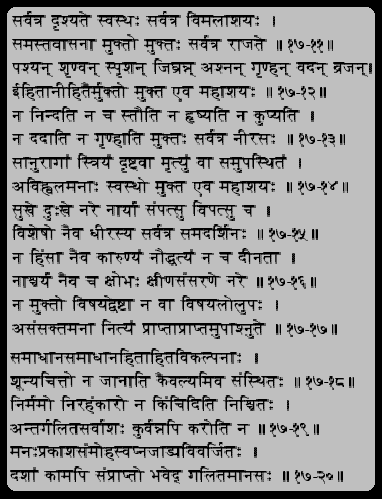



Ashtavakra said:
The
liberated man is resplendent everywhere, free from all desires.
Everywhere he appears self-possessed and pure of heart. 17.11
Seeing,
hearing, feeling, smelling, tasting, speaking, and walking about,
the great-souled man who is freed from trying to achieve or avoid
anything is free indeed. 17.12
The
liberated man is free from desires everywhere. He neither blames,
praises, rejoices, is disappointed, gives, nor takes. 17.13
When a
great-souled one is unperturbed in mind, and equally
self-possessed at either the sight of a woman inflamed with desire
or at approaching death, he is truly liberated. 17.14
There is no
distinction between pleasure and pain, man and woman,
success and failure for the wise man who looks on
everything as equal. 17.15
There is no
aggression nor compassion, no pride nor humility, no
wonder nor confusion for the man whose days of
samsara are over. 17.16
The
liberated man is not averse to the senses nor is he attached
to them. He enjoys hinself continually with an unattached
mind in both success and failure. 17.17
One
established in the Absolute state with an empty mind does not
know the alternatives of inner stillness and lack of inner stillness,
and of good and evil. 17.18
A man free
of "me" and "mine" and of a sense of responsibility,
aware that "Nothing exists," with all desires extinguished within,
does not act even in acting. 17.19
He whose
thinking mind is dissolved achieves the indescribable state
and is free from the mental display of delusion, dream,
and ignorance. 17.20
[Translation by John Richards]